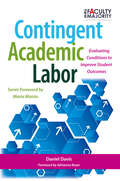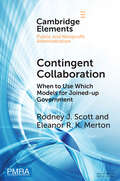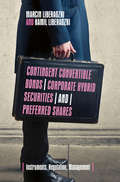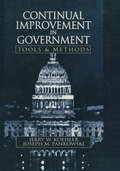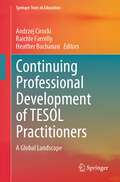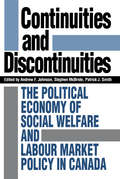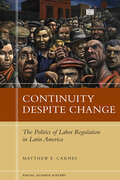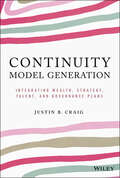- Table View
- List View
Continent in Crisis: The U.S. Civil War in North America (Reconstructing America)
by Brian Schoen, Jewel L. Spangler, and Frank TowersWritten by leading historians of the mid–nineteenth century United States, this book focuses on the continental dimensions of the U.S. Civil War. It joins a growing body of scholarship that seeks to understand the place of America’s mid-nineteenth-century crisis in the broader sweep of world history. However, unlike other studies that have pursued the Civil War’s connections with Europe and the Caribbean, this volume focuses on North America, particularly Mexico, British Canada, and sovereign indigenous states in the West.As the United States went through its Civil War and Reconstruction, Mexico endured its own civil war and then waged a four-year campaign to expel a French-imposed monarch. Meanwhile, Britain’s North American colonies were in complex and contested negotiations that culminated in confederation in 1867. In the West, indigenous nations faced an onslaught of settlers and soldiers seeking to conquer their lands for the United States. Yet despite this synchronicity, mainstream histories of the Civil War mostly ignore its connections to the political upheaval occurring elsewhere in North America.By reading North America into the history of the Civil War, this volume shows how battles over sovereignty in neighboring states became enmeshed with the fratricidal conflict in the United States. Its contributors explore these entangled histories in studies ranging from African Americans fleeing U.S. slavery by emigrating to Mexico to Confederate privateers finding allies in Halifax, Nova Scotia. This continental perspective highlights the uncertainty of the period when the fate of old nations and possibilities for new ones were truly up for grabs.
Continental Airlines--1992 (Abridged)
by Stuart C. Gilson Sam J. KaramThe CEO is preparing a recommendation to the board regarding several potential outside investments in the company, which is currently operating in bankruptcy. In making his decision, the CEO has to consider various financial and strategic factors, including possible synergy benefits and support for the company's huge planned expenditures on new aircraft. To assess the relative merits of the competing investment proposals, it is also necessary to value the company's assets and prescribe a new capital structure for the company after it leaves Chapter 11. Tax factors are extremely important in the analysis. The final decision must be acceptable to the company's creditors and be compatible with allowed U.S. bankruptcy practices.
Continental Carriers, Inc.
by W. Carl KesterA U.S. trucking company is considering using debt for the first time to acquire another company. The directors of the company are divided in their opinion of the likely impact of leverage on Continental Carriers' performance. Their differences must be reconciled and a decision reached about whether to issue new debt or equity to fund the acquisition. Students are introduced to the impact of leverage on performance variables such as profits, growth, earnings per share, and stock price. A rewritten version of an earlier case.
Continental Hope Group
by Christopher Marquis Qi LiThis case provides an opportunity to examine and discuss how a traditional Chinese private business was launched and developed into a globalizing, multi-industry corporation. It also highlights how second generation entrepreneurs successfully developed an innovative industry model to sustain a green and profitable business, how the company valued, motivated and retained its talent, and how Chinese private enterprise can go global.
Continental Media Group: Business Highlights
by Robert L. Simons Kathryn RosenbergContinental Media Group has a series of business reviews struggling to achieve profitability. This case focuses on the use of management control systems to identify emerging opportunities and the formulation of new strategies. The interactive system used by top managers-the Friday Packet-is described and illustrated in exhibits. Top managers use this system to focus organizational attention on the critical uncertainties of the business. Provides examples of how new strategies emerge from the dialogue that is generated by the interactive control system.
Continental Perspectives on the Geopolitical Economy of Football
by Simon Chadwick Paul Widdop Michael M. GoldmanThis book explores continental perspectives on football's new geopolitical economy, examining how sport, politics, and the global economy have emerged in different parts of the world. Against a backdrop of international conflict and the rise of powerful new state actors in world sport, the book delves into countries and cases that explore how football investments and events have become instruments of soft power and industrial development, and how football plays an increasingly significant role in global politics and international relations. Featuring the work of leading researchers from around the globe, and case studies from five continents, the book addresses key contemporary issues in world sport. It examines the Gulf States’ investments in European football, the debates around ‘sportwashing’ and human rights, the rise of sports in the politics and cultural relations of China and India, and football’s complex relationship with migration and identity in Africa and Latin America. The book also considers the seismic impact of Russia’s invasion of Ukraine on the geopolitics of football, the shifting landscape of football governance in Europe, the rise of Major League Soccer and the ‘Messi effect,’ and how the emergence of China and India as global economic superpowers is mirrored in their vision for their domestic football leagues. Additionally, the book highlights the role of FIFA and its commercial partners and stakeholders as key geopolitical actors on the world stage. This is essential reading for anyone interested in sport, political economy, international politics, globalization, or development.
Contingency Planning: Preparing Today for Tomorrow's Problems
by Richard LueckeSome crises are unavoidable. For those, you must practice contingency planning or organizing and making decisions before the crisis occurs. Making contingency plans for a fire emergency is an example of how to mitigate a crisis without knowing for certain if it will occur. This chapter offers a few tips for creating such contingency plans.
Contingent Academic Labor: Evaluating Conditions to Improve Student Outcomes (The\new Faculty Majority Ser.)
by Daniel B. DavisContingent Academic Labor is a concise guide that offers higher education professionals a way to measure the degree of equality taking place in work environments for non-tenure track faculty across institutional settings. It frames the relevant issues and examines the nationwide situation facing contingent faculty across the professional landscape. The goal is to review contingent faculty treatment, and offer a standardized way to identify both equitable and unjust practices that impact adjunct faculty and their students by extension.The main feature of this guide is The Contingent Labor Conditions Score, a tool to help evaluate current labor practices that impact adjuncts in both positive and negative ways. The report card measures 3 areas of labor conditions:*Material Equity: Pay, job security and benefits*Professional Equity: Opportunities for advancement, professional development, academic freedom, sense of professional inclusion, and job satisfaction*Social Equity: Gender and race parity between contingent and non-contingent faculty in proportion to the population servedThis book will be useful for administrators and labor organizers alike in assessing the degree of exploitation, or empowerment, in their own institution. The Contingent Labor Conditions Score, as a standardized tool, will serve audiences on both sides of the discussion in creating positive steps forward, improving not only contingent faculty working conditions, but ultimately improving student outcomes.
Contingent Collaboration: When to Use Which Models for Joined-up Government (Elements in Public and Nonprofit Administration)
by Rodney J. Scott Eleanor R. MertonThe question of how agencies can work together has been central to the field of public administration for several decades. Despite significant research, the process of collaboration can still be a fraught endeavour for practitioners. Nevertheless, agencies keep trying to work together because it is the only way to make progress on the biggest challenges facing public administrators. This Element reveals the deeply contingent nature of collaboration, rejecting the idea that collaboration can be reduced to a universal best practice. The New Zealand government has implemented such a contingent approach that maps different collaborative methods against problem settings and the degree of trade-off required from the actors' core or individual work. This Element provides a detailed case study of the New Zealand approach, and 18 embedded elements or 'model' collaborative forms for joined-up government. It explains how New Zealand public servants approach the important question: 'when to use which models?'.
Contingent Convertible Bonds, Corporate Hybrid Securities and Preferred Shares: Instruments, Regulation, Management
by Kamil Liberadzki Marcin LiberadzkiThis book is a comprehensive guide to the new generation of hybrid securities: subordinated and perpetual bonds with deferrable coupon first issued around 2003, and the youngest member of the hybrids family named CoCos (contingent convertibles) being a product of Basel III or European Union CRD IV regime (2014). Contingent capital constitutes a contractual recapitalization mechanism for troubled financial institutions. An increasing number of European banks have issued CoCo bonds in order to bolster their capital ratios. Following the EU pattern, CoCos issues have become increasingly popular within banks in Asia and the Pacific. The EU regulatory treatment of the contingent convertibles issued by banks and insurers together with bank bail-in instruments is at the forefront of the book. Furthermore, the book provides an overview of hybrids pricing and risk assessment approach and covers the non-voting preferred stocks as another hybrids class.
Contingent Faculty and the Remaking of Higher Education: A Labor History (Working Class in American History)
by Erin Hatton Elizabeth Tandy Shermer Eric Fure-Slocum Sue Doe Claire Raymond Gary Rhoades Steven Shulman Joe Berry Helena Worthen Steven Parfitt Claire Goldstene Elizabeth Hohl Gwendolyn Alker Aimee Loiselle Diane Angell Miguel Juarez Maria C Maisto Anne Wiegard William A Herbert Joseph van der Naald Jeff Schuhrke Anne McLeer Trevor Griffey Naomi R Williams Jiyoon ParkAn educational crisis from its origins to present-day experiences In the United States today, almost three-quarters of the people teaching in two- and four-year colleges and universities work as contingent faculty. They share the hardships endemic in the gig economy: lack of job security and health care, professional disrespect, and poverty wages that require them to juggle multiple jobs. This collection draws on a wide range of perspectives to examine the realities of the contingent faculty system through the lens of labor history. Essayists investigate structural changes that have caused the use of contingent faculty to skyrocket and illuminate how precarity shapes day-to-day experiences in the academic workplace. Other essays delve into the ways contingent faculty engage in collective action and other means to resist austerity measures, improve their working conditions, and instigate reforms in higher education. By challenging contingency, this volume issues a clear call to reclaim higher education’s public purpose. Interdisciplinary in approach and multifaceted in perspective, Contingent Faculty and the Remaking of Higher Education surveys the adjunct system and its costs. Contributors: Gwendolyn Alker, Diane Angell, Joe Berry, Sue Doe, Eric Fure-Slocum, Claire Goldstene, Trevor Griffey, Erin Hatton, William A. Herbert, Elizabeth Hohl, Miguel Juárez, Aimee Loiselle, Maria C. Maisto, Anne McLeer, Steven Parfitt, Jiyoon Park, Claire Raymond, Gary Rhoades, Jeff Schuhrke, Elizabeth Tandy Shermer, Steven Shulman, Joseph van der Naald, Anne Wiegard, Naomi R Williams, and Helena Worthen
Contingent Liabilities: Issues and Practice
by Aliona CebotariA report from the International Monetary Fund.
Contingent Valuation of Yangtze Finless Porpoises in Poyang Lake, China
by Yanyan DongThis book presents the findings of the study, and offers analysis of both its methodological and policy-related implications. On the methodology side, it assesses and validates the valuation workshop approach; appraises the effect of distance on willingness to pay and the influence of the respondents' ability to pay. From a policy perspective, the book examines the attitudes and preference of respondents on trade-offs between economic growth and ecological use.
Contingent Work, Disrupted Lives
by Belinda Leach Anthony WinsonContingent Work, Disrupted Lives examines the repercussions of economic globalization on several manufacturing-dependent rural communities in Canada. Foregrounding a distinct interest in the 'grassroots' effects of such contemporary corporate strategies as plant closures and downsizing, authors Anthony Winson and Belinda Leach consider the impact of this restructuring on the residents of various communities. The authors argue that the new rural economy involves a fundamental shift in the stability and security of people's lives and, ultimately, it causes wrenching change and an arduous struggle as rural dwellers struggle to rebuild their lives in the new economic terrain. Beginning with broader theoretical and empirical literature on global changes in the economy and the effects of these changes on labour, the text then focuses exploration on manufacturing in Ontario with an analysis of five community case studies. Winson and Leach give considerable attention to the testimony of numerous residents; they report on in-depth interviews with key respondents and blue-collar workers in five separate communities, ranging from diverse manufacturing towns to single-industry settlements. The result is an intimate contextual knowledge of the workers' lives and their attempts to adapt to the tumultuous economic terrain of 1990s rural Canada.Winner of the John Porter Prize for 2003, awarded by the Canadian Sociology and Anthropology Association.
Continual Improvement in Government Tools and Methods
by Jerry W. KoehlerKey to the success of quality implementation is the understandingteam members have of the process and the tools to be used. Continual Improvement in Government: Tools and Methods was designed to provide users with a complete description and practical examples of these tools and viable techniques that will benefit teams. This book examines the four most popular tools: flowcharting; cause and effect diagrams; Pareto charts; and histograms-and shows how to apply them in the public service sector.To improve processes requires effective decision-making and effective decision-making begins with accurate data. Koehler and Pankowski dispel the myths and fears of data collection and analysis. In a step-by-step approach, they lead you through the very heart of Quality Management...DATA. Continual Improvement in Government: Tools and Methods provides an understandable format that explains the importance of data, the differences in the quality of data, why it is collected, and how it is used.
Continuing Professional Development of TESOL Practitioners: A Global Landscape (Springer Texts in Education)
by Andrzej Cirocki Heather Buchanan Raichle FarrellyThis textbook serves as a current and comprehensive resource on effective Continuing Professional Development (CPD) for TESOL practitioners in various contexts around the world at various stages in their careers. The practices described by language teachers, teacher educators and professional development providers in this book offer a vision of critical issues to consider when designing and evaluating professional development opportunities. Effective professional development requires careful planning informed by the realities of the local context and the specific needs of the teachers. This textbook is designed to support those who provide professional development opportunities by presenting global perspectives on professional development for a range of teaching contexts at different language levels. Each chapter includes a discussion about the type and source of support available in the given context, as well as a reflection on the challenges that exist for both teachers and CPD providers. These insights serve to help CPD designers and providers as they problematize teacher development opportunities in their context. Each chapter concludes with a synthesis of the strengths of CPD in the local context and a discussion of future directions that target opportunities for transformation and improvement. This volume celebrates teachers, teacher educators and CPD providers around the world. High-impact practices are presented from fifteen countries: Cameroon, Canada, Costa Rica, Indonesia, Kazakhstan, Malta, New Zealand, Norway, Oman, Qatar, South Africa, South Korea, Sri Lanka, Tanzania and the United States of America.
Continuing Professional Development of Teachers in Finland
by Fred Dervin Yongjian LiThis book examines continuing professional development (CPD) of teachers in Finland. As one of the best-performing countries in terms of education, the Finnish education system is often revered and held up as an example to follow. However, the authors argue that CPD actually constitutes the Achilles’ heel of this ‘miraculous’ system, demonstrating that in fact it is a victim of contradictory discourses and actions among decision-makers, teacher educators and practitioners. Including extensive interviews from CPD providers, teachers and other educational actors, the authors critically discuss the ‘wonders’ of Finnish education, in the process debunking various myths created both inside and outside Finland. The authors also call for a new approach to comparative and international education. Based on over 20 years of experience in Finnish education, this pioneering book will be of interest and value to students and scholars of Finnish education, continuing professional development and international education branding more generally.
Continuing Professional Development: A Practical Guide for Teachers and Schools (Educational Management Ser.)
by Anna CraftFirst Published in 2004. Routledge is an imprint of Taylor & Francis, an informa company.
Continuing Professional Development: Lifelong Learning of Millions
by Andrew L. FriedmanContinuing Professional Development (CPD) is the means by which the professions across the world ensure that their knowledge and skills remain up to date and relevant to changing needs and environments. CPD significantly contributes to the quality and reputation of the professions and therefore to the quality of national and international social life and economic well being. Starting with a discussion on what CPD is, the author analyzes how professional bodies govern CPD, what support they provide to individual professionals and how they measure or evaluate what individuals do under the provenance of CPD. Continuing Professional Development explains why, up to now, CPD has been a relatively neglected subject in spite of it being carried out by millions. It argues whether a variety of perspectives or visions of CPD has held back wider public appreciation of it and if greater co-ordination by professional bodies, or the introduction of new players to the field, will change this in the future. Providing the first comprehensive study of the subject, this innovative book will be required reading for CPD professionals and researchers and is a fascinating read for all professionals, especially those involved with human resource development and management / leadership development.
Continuing Transformation of Asahi Glass: Implementing EVA
by Mihir A. Desai Masako Egawa Yanjun WangThis case explores the use of EVA--economic value added--methodology at Asahi Glass. EVA is among the changes initiated by the CEO aimed at transforming Asahi Glass from a traditional Japanese company to a global firm. Other changes included a corporate reorganization into worldwide business groups, the appointment of non-Japanese managers to key positions, and corporate governance reforms. The EVA methodology was introduced to improve resource allocation across Asahi's numerous businesses around the world and to evaluate the managerial performance of top executives. It examines how the company calculated EVA and, in particular, how it calculated the weighted average cost of capital for its different businesses in different countries. Is Asahi Glass gaining benefits from the EVA methodology, and does it contribute to the transformation of Asahi Glass into a truly international firm?
Continuing to Teach: Stories of Attrition and Retention
by Elizabeth AllottaThis book shares insights from experienced teachers who were invited to share the experiences challenging their decision to continue in the profession. Their stories are captured narratively through a critical ethnographic lens in fictional professional learning team (PLT) meetings, woven together and retold as collegial conversations centred around topics and themes in a school leadership text. These meetings focus on the themes of trust, truthfulness, workload, time and change. Their stories reveal themes of bullying, misogyny, sexism, power disparities, lies and deceit, lack of support, and inconsistent and questionable leadership decisions. Professionalism, ethical practice, and the nature of schools are questioned, along with perceptions and the need for change. The insights shared in the book will be of interest to academics researching teacher attrition and experiences, and those involved in teacher preparation.
Continuities and Discontinuities
by Patrick J. Smith Andrew Johnson Stephen McbrideContinuities and Discontinuities assesses the making of Canadian social and labour market policy in the context of two factors--globalization and neoconservatism. Specialists from a variety of fields and disciplines examine the relation between Canada's changing political economy and its social welfare and labour market policy. These essays analysing continuities and discontinuities in policy emerged from research that initially was presented at the 5th Conference on Social Welfare Policy held at Bishop's University in 1991, and that since then has been revised to reflect the situation of the mid-1990s.Part I introduces the three broad areas explored in the volume. Part II addresses new trends in Canadian political economy and their relation to public policy.Part III analyses social welfare policy. Of the essays included, several investigate the democratizing of the Canadian welfare state and controversies in the conception and definition of poverty. Others address the AIDS crisis, health policy, and social policy issues that primarily affect women, children, and native peoples.In Part IV recent Canadian labour market policies are investigated and appraised, and alternatives suggested or evaluated. One essay argues that employment security and high wages could generate high productivity and international competitiveness; another examines the impact of the growth in part-time employment on the welfare state; a third probes the relation of organized labour to a guaranteed annual income; others investigate the impact of neoconservatism on labour market policy-making in various provinces and regions.Globalization and neoconservatism continue to shape change and require constant evaluation. These thought-provoking and informative essays are an important contribution to the ongoing debate on social welfare and labour market policy in Canada.
Continuity Despite Change: The Politics of Labor Regulation in Latin America
by Matthew E. CarnesAs the dust settles on nearly three decades of economic reform in Latin America, one of the most fundamental economic policy areas has changed far less than expected: labor regulation. To date, Latin America's labor laws remain both rigidly protective and remarkably diverse. Continuity Despite Change develops a new theoretical framework for understanding labor laws and their change through time, beginning by conceptualizing labor laws as comprehensive systems or "regimes." In this context, Matthew Carnes demonstrates that the reform measures introduced in the 1980s and 1990s have only marginally modified the labor laws from decades earlier. To explain this continuity, he argues that labor law development is constrained by long-term economic conditions and labor market institutions. He points specifically to two key factors—the distribution of worker skill levels and the organizational capacity of workers. Carnes presents cross-national statistical evidence from the eighteen major Latin American economies to show that the theory holds for the decades from the 1980s to the 2000s, a period in which many countries grappled with proposed changes to their labor laws. He then offers theoretically grounded narratives to explain the different labor law configurations and reform paths of Chile, Peru, and Argentina. His findings push for a rethinking of the impact of globalization on labor regulation, as economic and political institutions governing labor have proven to be more resilient than earlier studies have suggested.
Continuity Model Generation: Integrating Wealth, Strategy, Talent, and Governance Plans
by Justin B. CraigOrganize and plan for your family business’s continued, intergenerational success Continuity Model Generation: Integrating Wealth, Strategy, Talent, and Governance Plans delivers a cohesive and comprehensive plan for family business leaders who seek to improve the chances of sustaining success across generations. Incorporating four distinct—but closely related—plans, Continuity Model Generation shows family businesses how to manage their strategy, their wealth, their talent, and their governance to achieve multi-generational success. The book also offers: A coherent framework (Continuity Canvas) for the integration of its multiple plans affecting every critical aspect of the family-owned or controlled business Straightforward and practical frameworks, meta-frameworks, and cornerstones to ground your family business’s strategy A variety of templates, checklists, and forms to organize your thinking and strategy Ideal for business-owning families, as well as their stakeholders and those who advise them, Continuity Model Generation: Integrating Wealth, Strategy, Talent, and Governance Plans is required reading for anyone interested in maintaining and developing family-based wealth.
Continuity and Change in Psychoanalysis: Letters from Milan
by Luciana Nissim MomiglianoThis book reflects certain continuity, dealing with the issue of how to be an analyst—through the different stages by which the author's psychoanalytic identity develops, from candidate to analyst and sometimes on to training analyst—in the continually changing world of our time.



